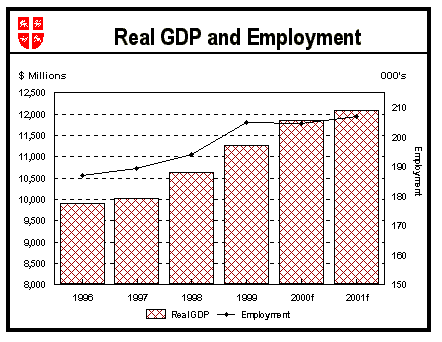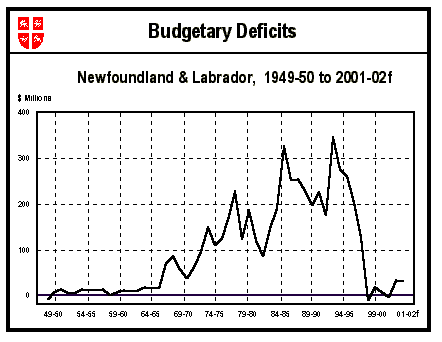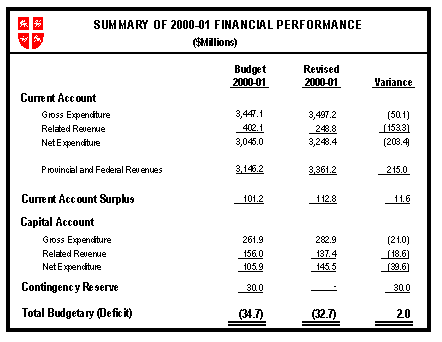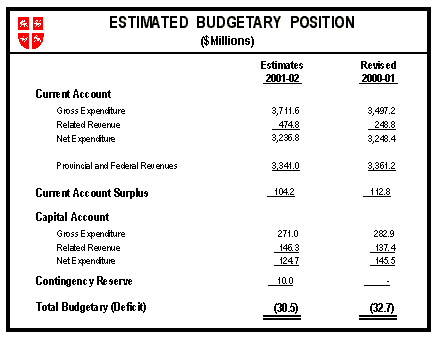|
|
|
BUDGET PLAN
Our Economic Climate 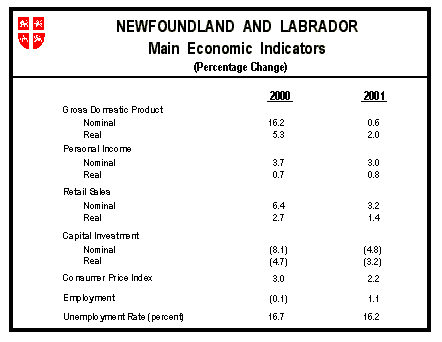
Mr. Speaker, the economic climate is an important factor in formulating our budget plan. In 2000, our economy grew in excess of 5 percent in real terms for the third consecutive year. This has increased consumer and business confidence, and is reflected in gains in retail trade and personal income. The unemployment rate declined to its lowest level since 1990. In-migration, people moving to the province, continued to increase, reaching the highest level in 25 years. This reduced net out-migration to 2,077, its lowest level in almost a decade and well below the average annual historical level of 3,750 in the 20 year period prior to early 1990s. Exports continue to account for over half of growth, driven in 2000 by the first year of full production at Hibernia, as well as strong performances in other resource sectors. A record number of tourists also came to our province in 2000. Revenues to the province, however, will continue to lag economic gains for some time, constraining fiscal flexibility.
Oil revenues will remain modest until project capital costs are recouped. Overall, many revenue gains are offset by concurrent reductions in Equalization. So while the economy is producing some solid results, this does not necessarily translate into similar growth in government revenues. Real economic growth in 2001 is expected to be 2 percent, reflecting, in part, completion of Terra Nova construction and oil production commencing late in the year. A major factor in the economic outlook, but still uncertain, is the extent the province may be impacted by an economic slowdown in the United States, our major export market. The effect a U.S. slowdown could have on the Canadian economy generally is also a factor. While there are uncertainties in the national and international economies, we are expecting growth in our economy in 2001 to be broadly based, reflecting the underlying strength of many sectors. With employment expected to grow, the unemployment rate could further decline. Our population should stabilize as out-migration continues to slow. Our Fiscal Framework With the strong provincial and national economies in 2000, we will slightly better our deficit target for the year just ending. At $32.7 million, the deficit for 2000-01 is $2 million lower than forecast last year. We have now recorded the best fiscal performance for any consecutive five year period since the early 1960s. Mr. Speaker, each year we have not only met, but improved upon, our deficit targets.
This demonstrates that we are successfully managing the affairs of the province both in the short term, but more importantly in the longer term, creating the stability necessary to promote economic growth and to sustain public services. The strategy we have utilized for several years in managing public finances is to shift revenues from years where we would have unnecessarily high surpluses to years where we would otherwise have excessively high deficits. This smoothing of the peaks and valleys of our fiscal position has been a significant factor in creating the stability the province has enjoyed over the past five years. We are employing this strategy again to ensure that the province will sustain a sound fiscal performance in 2001-02. For the year just ending, we incurred additional expenditures of $65 million including some year end investments, partly funded out of the $30 million contingency reserve, giving a net cost of $35 million. This was offset by increased current account revenues of $233.8 million, primarily additional Equalization and income tax. This could have created a surplus for 2000-01 of $164.1 million. However, if we recorded that surplus, the province would have faced a deficit of $227.3 million in the new fiscal year. The impact that this would have on services like health and education would be devastating.
To maintain stability in both our finances and our services, government has again shifted a pool of flexible revenues forward to the new fiscal year. By shifting $196.8 million in revenues forward to 2001-02, primarily accumulated dividends from Newfoundland and Labrador Hydro and sinking fund revenues, we can reduce the deficit for the new fiscal year from $227.3 million to a more prudent and fiscally manageable target of $30.5 million. By following this strategy we are able to create fiscal flexibility in 2001-02 to undertake many important initiatives, particularly investments in health and our youth. The fiscal plan and deficit target for 2001-02 includes provision for a 3 percent salary increase for provincial employees. To reach a prudent deficit, we have reduced the $30 million contingency reserve, which has been in place for several years to provide a measure of protection against unforeseen increases in expenditures or declines in revenues, to $10 million. While, in our view, it is unlikely we will see large unanticipated revenue gains again this year, our solid record on expenditure management gives us confidence that our deficit target can be achieved. Mr. Speaker, I am pleased to announce that we will achieve our fiscal objectives with no new taxes and no tax increases. Public Sector Collective Bargaining Public sector collective bargaining is a key issue for our budget plan. Salary costs are by far the largest component of our budget. About 80 percent of health care costs are salaries. About 70 percent of the cost of the education system is salaries. Every 1 percent increase in our salary budget equates to about $18 million in additional costs. We believe our public sector employees deserve a fair and significant salary increase. We have taken careful account of what our people can afford. In our view, Mr. Speaker, by any reasonable measure, we have made that offer. |
|
|
|
All material copyright the Government of Newfoundland and Labrador. No unauthorized copying or redeployment permitted. The Government assumes no responsibility for the accuracy of any material deployed on an unauthorized server. Disclaimer/Copyright/Privacy Statement |

